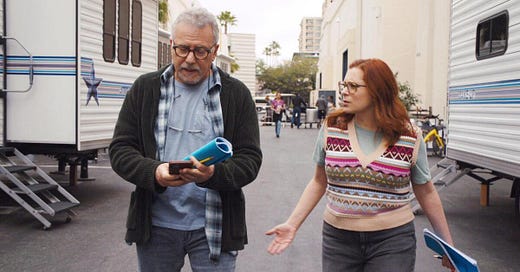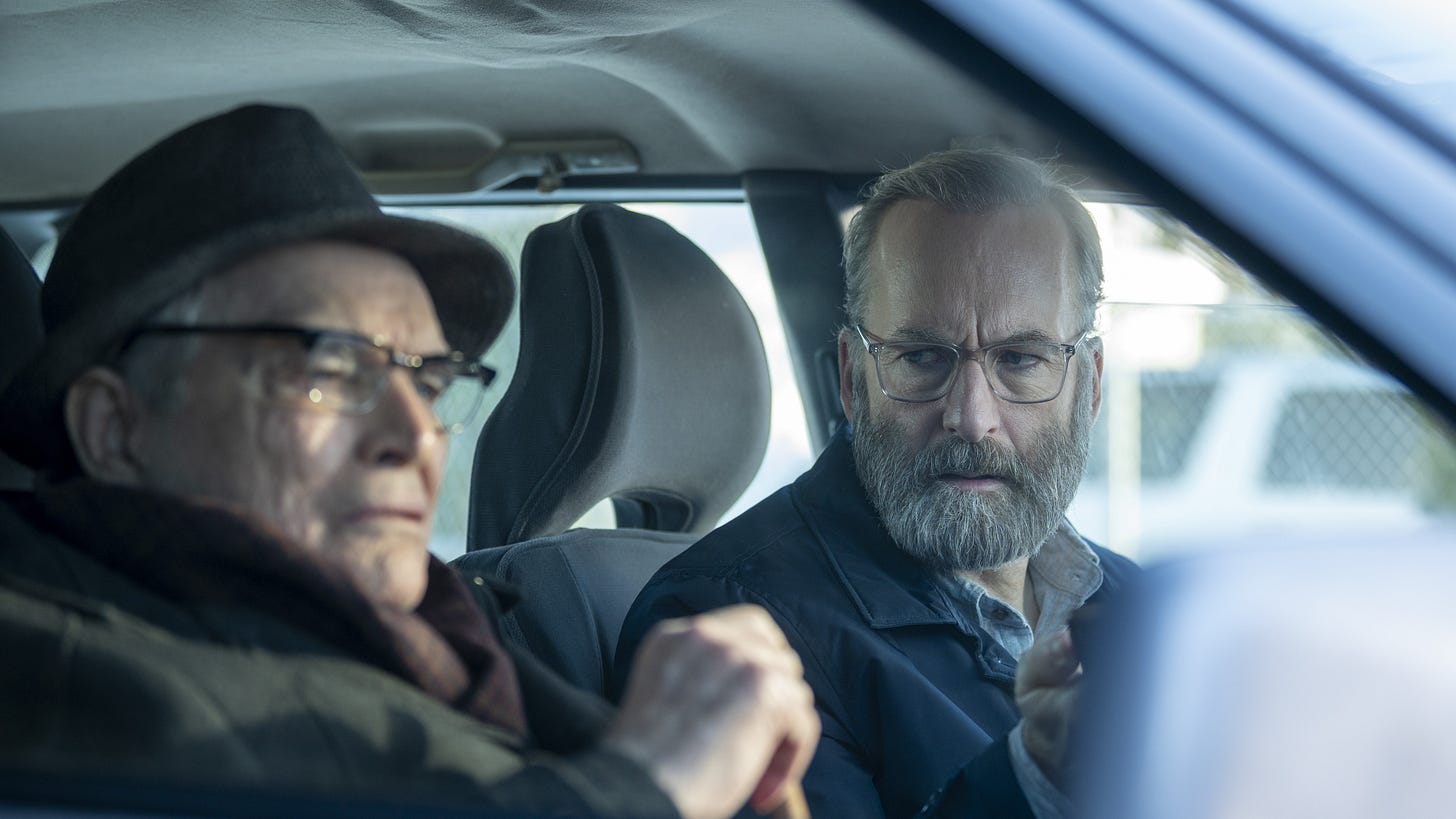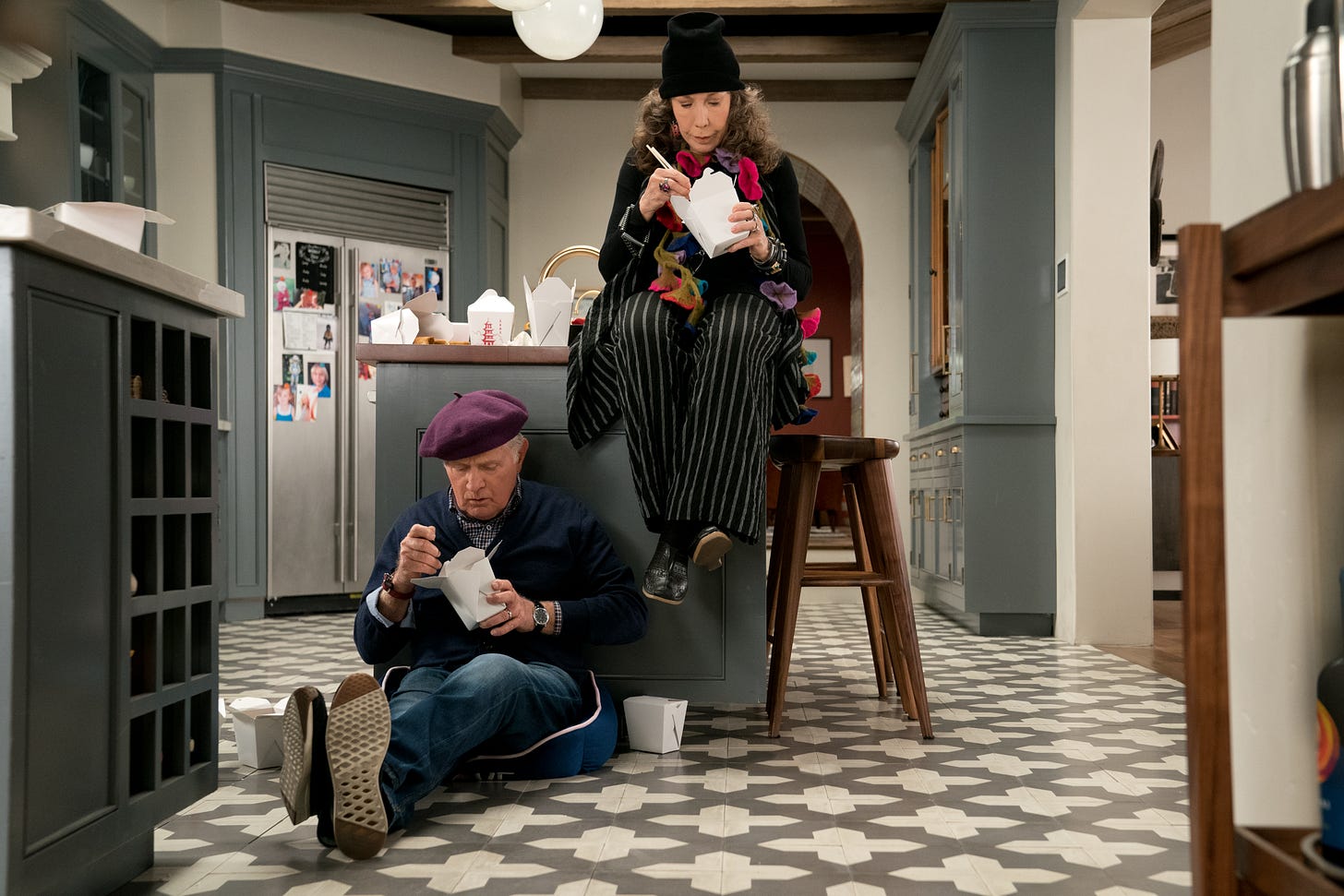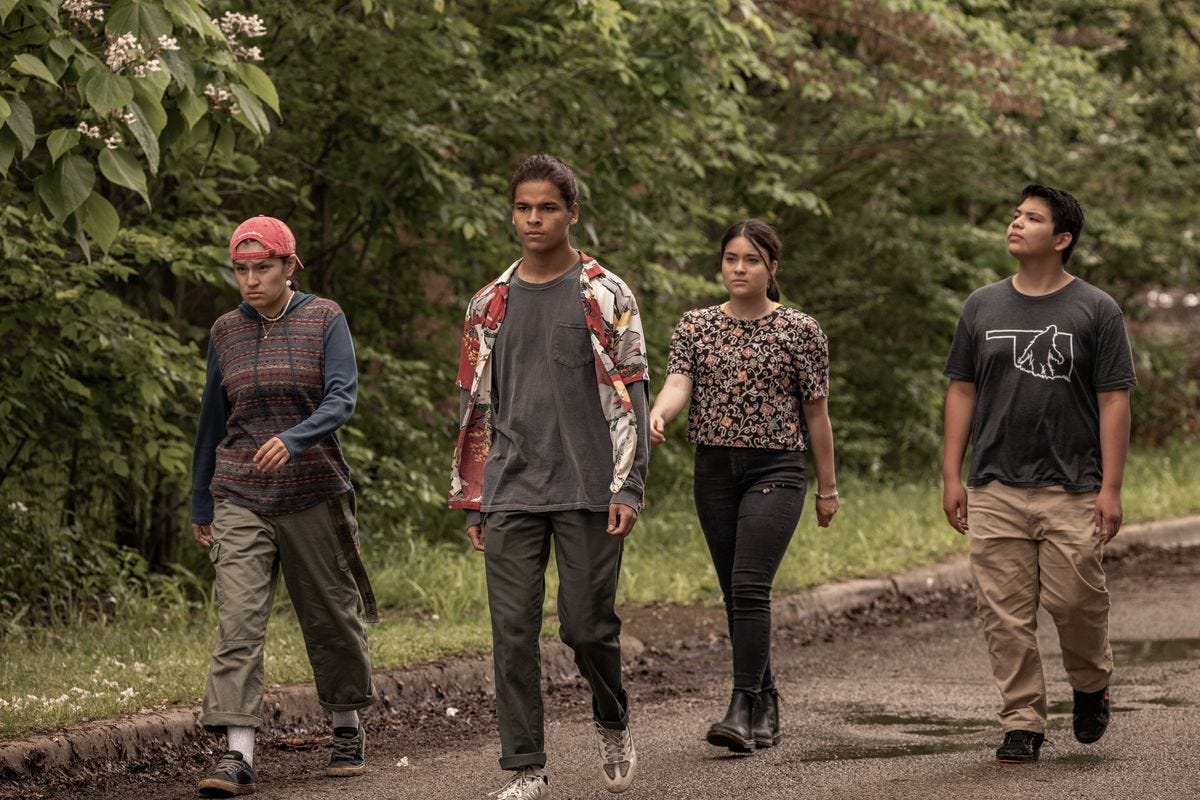Dads Who Leave and Dads Who Stay
My collection of stories about dad relationships in television and the impact of a parent's apology.
Content note: Today’s newsletter contains spoilers for the shows Reboot, Lucky Hank, Grace & Frankie, Ted Lasso, and Reservation Dogs.
Hi, it’s me. I’ve been watching a lot of Dad Stuff lately. Not on purpose, but it seems to be a subject gaining traction in a wave of new TV shows. I first noticed this on Hulu’s, Reboot, a show about rebooting a fictional show from 15 years ago. I scrolled past it when I first noticed the trailer, thinking it was just your standard tongue-in-cheek comedy about today’s reboot culture. But a write-up from fellow Substacker
piqued my interest,1 so I gave it a shot and fell in love. Now I’m disappointed it was dropped by Hulu! I hope it finds a new home — it hits my sweet spot of being poignant and funny.Relatable stories about dads that make me feel less alone.
The premise of the show is a sitcom reboot created by Hannah, but the original show’s creator (Gordon) catches wind of it and weasels his way into this new project. The story twist is that the old showrunner is the new showrunner’s dad, and they have a complicated, estranged relationship. Gordon’s original version of the show was based on his family – not the family he had with Hannah, but a new family he started after leaving Hannah and her mom.
Ouch.
Hannah’s reboot version of the show was going to be a reckoning, where the TV family discovers their TV dad has another kid they never knew about. Within a few episodes, Reboot became a multi-layered, relatable childhood fantasy – Hannah’s dream of rebooting a family within a show about a family, of rebooting history and writing a new story.
This story hit me in the feels.
I was especially moved by Hannah's skepticism, yet openness at working with and learning to trust her dad again. You could tell she was deeply angry at him, yet hopeful that maybe he had changed. There were points when trust was built, and then he'd let her down. As an adult, she had a voice she couldn’t access when she was a child – she could express things to him that she didn’t have the words for growing up.
And despite all this, the show is silly. I laughed! And Paul Reiser presents as a pleasant, cardigan-wearing, charismatic dad you want to love on the surface, but whose well-oiled avoidance tactics start to grate on you. You start off rooting for both of them, but by the end of the season you’re crying and shouting at the TV that Hannah is a goddamn magical unicorn and Gordon will never appreciate what he missed out on.
And then there’s Lucky Hank, the latest with Better Call Saul’s Bob Odenkirk that has a plot similar to The Chair with Sandra Oh — both shows are about English department faculty dynamics at a small, liberal arts college.
Hank is a curmudgeon who complains about everything, yet won’t do anything to change what he can of his circumstances. His lifelong anger toward his father Henry for abandoning him and his mom is what fuels his discontent. He can’t stand that his father went on to be successful in his career. He’s judgy about the multiple women — female students — his father hooked up with over the years. He obsesses about never wanting to see him again, yet fantasizes about telling him off.
Finally, he gets his chance to unload on his dad — or so he thinks. His dad moves back to the area when he retires, and his mom lets him move back in with her. Hank is baffled she would agree to this after all that’s happened. He goes to his mom’s house to confront his dad and insist he leave, but instead he meets a man with dementia who floats in and out of lucidity, not remembering who Hank is.
Hank missed his opportunity to unleash all of his anger on the person who deserves it most, to punish him for the years of abandonment, particularly when he was a teenage boy who struggled with mental health.
But the moment that struck me the most was when the two of them are at a hardware store and Hank’s dad has a moment of lucidity. Hank confronts him about his multiple affairs.
“Cheating is a part of marriage!” his dad says, waving him off.
“No!” says Hank. “It’s hurtful and it’s wrong!”
“I’ve been there, buddy,” his dad says. “But sometimes it’s right. Sure, there are tears, but people come out stronger.”
Hank is dumbfounded as decades of his feelings are immediately dismissed, and he walks out of the store without Henry.
After decades of carrying a burden that could have benefited from therapy, and decades of sacrificing his present relationships by obsessing over his father’s failings, Hank finally seems to have realized his dad would not be moved by a rational take on the need to apologize.
This story hit me. I have a history with stories like this.
Over the course of the season I recognized the anguish in Hank’s furrowed brow, in his narrowed thinking eyes, in his search for why — in the final realization that an apology will likely never come. Hank’s confrontational let-down was the most realistic thing in the whole series, because we all fantasize about those climactic movie scenes where the hero confronts the bully or expresses his love to the girl who had friend-zoned him, and everyone gets what they deserve. Happily ever after.
But in real life, most of us will never get the satisfaction of making a Big Speech at the end of our movie, underpinned by dramatic swells of music.
Stories about apologies give me hope.
Grace & Frankie is a delightful show with an all-star cast of Jane Fonda (Grace), Lily Tomlin (Frankie), Martin Sheen (Robert), and Sam Waterston (Sol). The premise of the show is established in the first episode: Married couple Grace & Robert are out to dinner with married couple Frankie & Sol – Robert and Sol are long-time business partners as divorce attorneys.
At this dinner, Robert and Sol confess to their wives that they’ve been having a 20 year long affair and would like divorces so they can be together openly. Twist! The rest of season one is them and their adult children reeling from this news and figuring out what the new normal looks like. Robert and Sol finally move in together and live as a couple, and Frankie & Grace become housemates.
You would think a parent couple-swap wouldn’t be relatable content, but in my case, you’d be wrong. I was hooked from the first episode as I watched a version of my childhood play out with comedic poignancy. But it wasn’t until season two that I was delivered an eye-opening plot point that would be surprisingly cathartic: Robert apologized to Frankie, the wife of the man he’d had an affair with.
“Frankie, I’m sorry. I should have said it a long time ago. I apologize for causing you pain, for all those years sneaking around and being disrespectful to you. I’m terribly, terribly sorry.”
I was speechless. And also bawling. As a forty-something grown-ass woman I hadn’t realized how important it was to hear those words so clearly and specifically, and even though they weren’t spoken to me or about my family, they were healing nonetheless.
It was the apology I needed to hear, even if it was somewhat of a fantasy.
I don’t know if forgiveness is something people in general think about as much as we do in the Christian faith where it’s kind of the whole point, but I’ve noodled on the idea forgiveness my whole life. I know that forgiveness is one-sided — I can forgive someone, even if they don’t acknowledge they’ve done me wrong. I know that forgiveness takes work to initiate and maintain – it’s not a one-and-done type deal.
I also know that forgiveness doesn’t require reconciliation or a restored relationship with the person who’s hurt you; this is where the apology comes in.
When Robert apologized to Frankie, he acknowledged his actions as the cause of her pain, and it enabled them to move forward into a new kind of restored relationship. It was a gift to Frankie that he apologized, because she could have moved on without it, but because he apologized, their relationship as friends could be restored.
Later in season six, Frankie would begin dating a man (Jack) who suffered from debilitating mental anguish and bitterness over losing his wife in a dramatic divorce battle decades ago. It was soon discovered that Sol and Robert were his wife’s divorce lawyers who screwed him over on her behalf. Predictably, even though Robert and Sol apologized for what they had done, he demanded Frankie choose between friendship with Sol (and Robert) and friendship with him. Frankie really liked this guy and gave him something to think about before he walked out the door on her:
“I get it Jack, Sol did a terrible thing to you. He did a terrible thing to me, too. But I was able to move past it. So you can go out that door, but if you don’t let go of your anger, it doesn’t matter how far you walk – it’ll follow you. But I won’t.”
She acknowledged the terrible, hurtful thing. She didn’t dismiss it or wave it off. She said, I’ve been in that hole, and here’s how I climbed out. The lesson I love seeing within this beautiful story arc is that apologies can help make forgiveness contagious. We can give each other the gift of healing and growth by taking responsibility for our actions and apologizing to the ones we’ve hurt.
In season three of Ted Lasso, the character of Nate experienced a double whammy of a life-changing apology from his dad2 and the gift of forgiveness from Coach Beard.3 These contributed to a change of heart (which was already in motion) and to reconciliation between Nate, Will & the team, and Ted.
writes about this on her Substack:It is a powerful moment, and obviously something that Nate has been needing for a long time. He needed his father to acknowledge how he hurt Nate and to let him know that he loved him. And that apology led Nate to his own apology to Will.
When we’re hurt, we can pass that hurt on. And parental hurt is so foundational that it shapes a lot of how we see ourselves and how we treat others. So a parental apology can make a huge difference in someone’s life. We are seeing a lot of films beginning to recognize the need for parents to apologize to their children. Encanto, Everything Everywhere All At Once, Turning Red - there is a trend of media showing parents owning their mistakes and taking responsibility for the hurt they caused. I hope that it causes a trend in the real world of parents being willing to apologize when they need to.4
It’s not really about the leaving or the staying.
I’ve written a whole section on how Bryan and I have been intentional with apologizing to each other and to our kids, but this is getting a little long so I’ll save it for another time. Instead, I’ll conclude with a scene from Reservation Dogs season one.
The teenage character of Bear was looking forward to a visit from his very unreliable dad, who hadn’t been around much and was planning a visit from out of state. The day he was supposed to come, he called Bear to let him know “something came up” and he didn’t get on the plane. Bear was sitting in the car with his mom, devastated by this news, and she said something very special to her son that I wish I’d figured out when I was his age. She said,
“If you want your dad in your life, you need to know it’s not going to be on your terms. If that’s what you want, I’m here to support you. But if you don’t want that, you tell me and I will cut him off.”
We have to decide our level of tolerance for accepting people as they are, not as who we want them to be. These are wise words from a woman who has already wrestled with this, I’m sure.
I’ve devoted probably too much energy wondering how people like Hannah’s or Hank’s dad can move through life without pursuing reconciliation. It makes me wonder what happened to them. Do they feel shame? Justified? Like they did nothing wrong? I’ve heard, “That’s between me and God,” but what about the person they’ve hurt?
Our stories are intertwined. When someone’s story impacts our own story in a way that hurts, we may have the opportunity to reconcile, and we may not. We may not want to reconcile, if it’s not a safe relationship.
Hannah and Hank didn’t get their apologies yet, and maybe they never will. They (we) have to learn how to be enough for ourselves, how to make peace with our own expectations. This is the gift we can give ourselves.
I know this was a long one - thanks for making it all the way through. Five gold stars for you!
⭐⭐⭐⭐⭐
Until next time,
Jen
Beth’s Substack:
Nate’s dad apologizes:
Coach Beard’s Big Speech forgiving Nate:
Alise’s substack:










Weird that all of my photo captions disappeared? 🤷🏼♀️
Just recently reconnected with my dad after 9 years. Really, more like 12 or 13 since anything substantial. I was the one that reached out. He never had. I did it so I could say I had. He seemed to welcome it, and he even managed a tepid, vague apology for "the times we weren't getting along." I simply said thanks. Like many who can relate to your post, I'll never have memories of the warmth, safety, guidance, and inspiration that can come from healthy fathering. But I can know now that was about his limited ability and background, not my lack of worthiness.